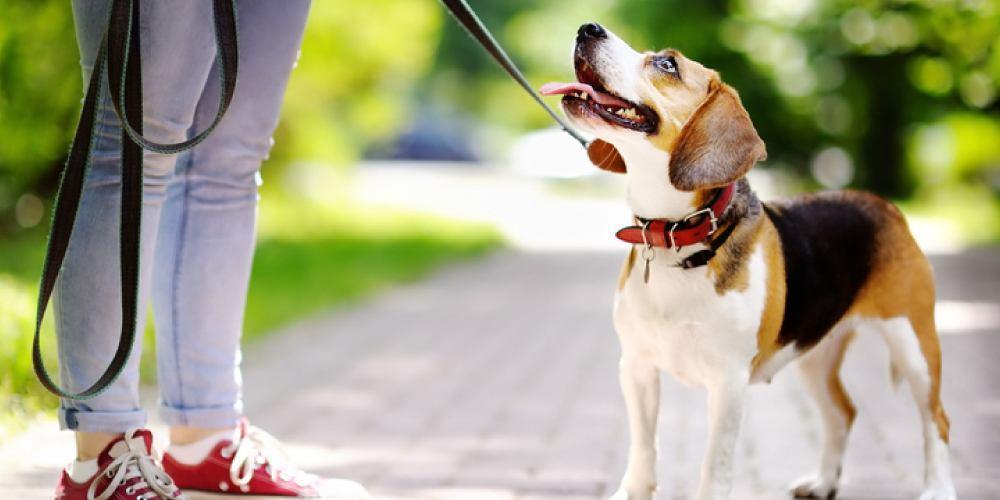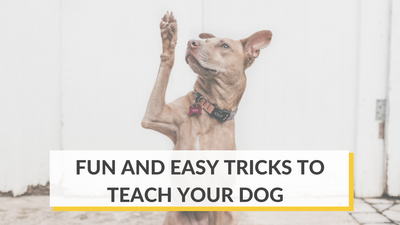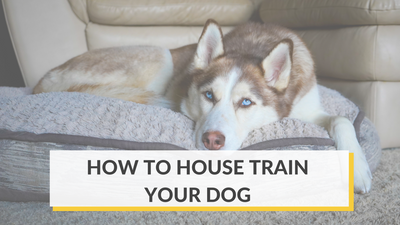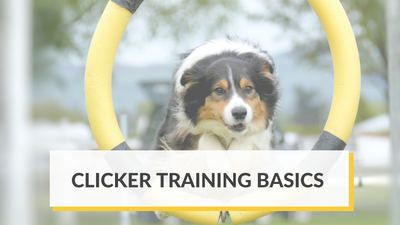As a pawrent, you might be wondering if you can train your dog at home or if you'll need to take your furbaby to a professional trainer for obedience training. Although training might seem intimidating, it's something you and your furbaby can accomplish together in your house or yard. All you need is a little know-how and patience and, before long, you and your pup can enjoy the benefits of good behavior.
Obedience training is vital to enjoying time with your dog in public, at home, and around people and other animals. With a well-behaved furbaby, you can explore the world together safely and stress-free. A trained puppy is less likely to rocket out of the front door, get into brawls with other pups, or jump up on house guests.
So where do you get started? In this post, we'll cover the basics — from what commands you should teach your dog first to puppy-training tips you can use at home.
When to Start Training Your Puppy
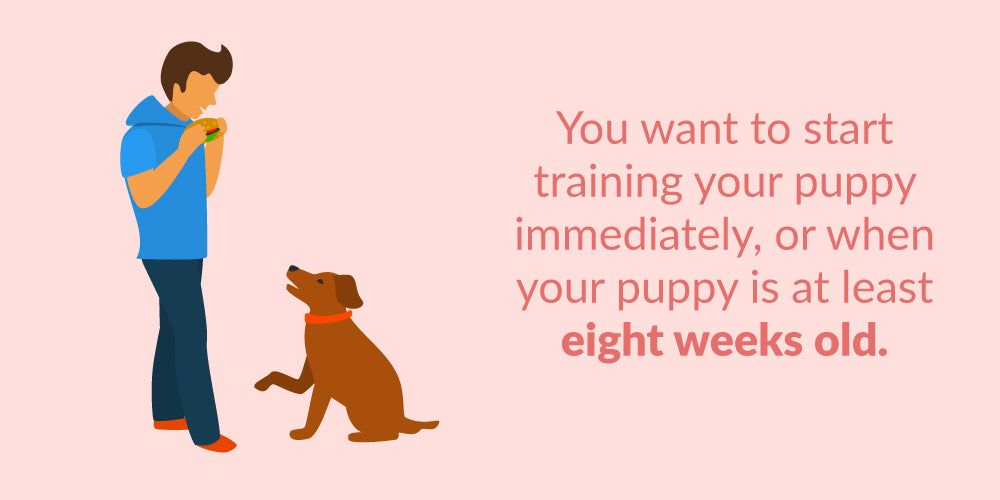
You want to start training your puppy immediately, or when your puppy is at least eight weeks old. Puppies can learn to wear a collar and begin to recognize praise at about 8 weeks and you can start teaching basic commands at 12 weeks. Since most puppies leave their mother when they are between 7 and 9 weeks old, you'll be able to start training the moment you bring your furbaby home.
Your pup needs to learn right away that you are the leader of the pack. If you wait to teach your furbabies when they are older, you might have to break bad habits and show them new ones. It's easier and quicker to teach pups when they are young and malleable. The easiest trick in the book of training your dog is to not reward undesirable behaviors and reward behaviors you like.
Steps for Training a Puppy
-
Understand that your furbaby learns through the consequences of their behavior. If a behavior leads to a tasty treat or a walk in the park, your furbaby will continue the behavior to keep getting rewards. On the other hand, if a behavior results in a lack of a reward, there is less reason to continue the behavior.
Although opinions differ, there is no need to punish your furbaby for bad behavior. Instead, focus on rewarding good behavior. The benefit of a reward-focused approach is your furbaby will be less likely to fear you or others, but still learn to obey the rules.
- Realize that your furbaby is not acting in mysterious ways. For example, your pup might jump up on you to get attention. To stop this behavior, ignore them when they jump on you. They will soon realize that they do not receive what they want when they jump — no scolding necessary. On the contrary, if you greet your pup with affection when they climb up you the moment you walk through the door, they will continue this behavior.
Here are some simple commands you can teach your puppy.
Related Post:
Simple Commands you should teach your puppy
How Long Should You Train Your Puppy Each Day?
Imagine a two-year-old baby. You probably would not plan to start teaching them algebra, right? Puppies are no different. They have short attention spans and need to learn basic commands before they can advance to more complex training.
Because puppies get distracted easily, try to keep training sessions short but regular. When you're teaching your furbaby new skills, aim to train every single day for 15 minutes or less per session. You might break up 15 minutes of daily training in five-minute sessions each day — it's up to you and what works best for your pup. The key is to keep training short, fun and positive.
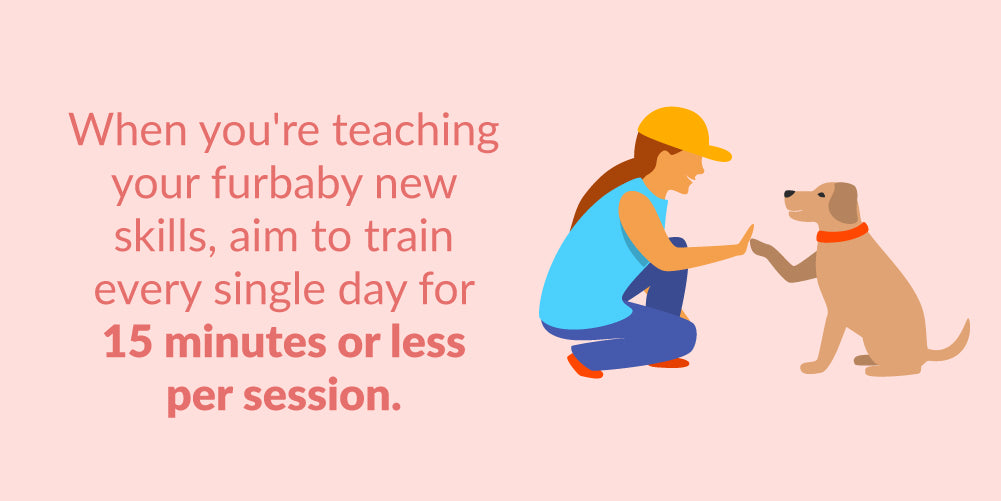
There is no set rule on how often to train your furbaby. Instead, aim to train when your puppy seems interested or ready. If they act tired or if there are a lot of distractions in the home, do a training session at a different time. If your pup seems bored or frustrated, end the training session and try again later.
Puppy Training Tips at Home
One benefit of training your puppy at home is you can control the environment and the number of distractions in the room. It's best not to teach new skills when a lot is going on in the house because you want to keep distractions to a minimum. Also, once your puppy gets the hang of a command, make sure to practice commands in different rooms and around different people, so they learn to listen in any situation.
Here are few tips to keep in mind while training your furbaby:
- Be consistent: To avoid confusing your furbaby and to make training the most effective, make sure you and other family members react to your pup's behavior the same way every time.
- Be immediate: Dogs can only connect consequences to their behavior if the consequences are immediate. Unlike humans, furbabies do not contemplate punishment days or even hours later. Rewards and consequences must be immediate. So, if your furbaby had an accident in the house while you were away, punishing them much later is meaningless. Instead, focus on training your pup to go potty outside.
- Be clear: Our language is a foreign language to furbabies, so try to communicate in short, clear words when training. For example, if you are teaching the "sit" command, simply say "sit." Do not say "sit on the floor" or "sit down, Lucky," for example. Keep commands short and sweet.
- Be patient: Training takes time and effort and you might experience setbacks. Take small steps and wait until your furbaby becomes a master at each baby step before moving on to the next one. If your pup seems stuck learning a new skill, go back to something they know and practice a few times before increasing the level of difficulty. You'll both get there eventually!
Most importantly, do not stress out about training. Relax and hang in there! With patience, consistency and practice, your furbaby will learn new commands. Make sure they have plenty of time for play and affection and they'll be eager to learn.
Train With Furbo Dog Camera
Obedience training is necessary to make the most of your relationship with your furbaby. When your pup behaves well, you can do so much more together, from exploring new places to meeting new people and other furbabies. As a result, your puppy will be happier, more relaxed and healthier than if they were confined to the house due to poor behavior. Also, with obedience training, you'll enjoy greater peace within the home.
Teach them while they're young to build a good foundation for life — and keep practicing regularly so they don't forget what they learned. You'll be amazed at what your furbaby can do!
Furbo Dog Camera is here to help you train and make the process fun for both you and your puppy. With Furbo, you can keep an eye on your furbaby when you're at work, out with friends or anywhere miles away from home. You can watch their behavior from your smartphone to see areas that might need improvement. Similarly, you can reward or comfort your pup while you're away by easily dispensing treats from Furbo. All you need to do is press a button on your phone and Furbo will toss a treat to your furbaby following a clicking sound. It's perfect for obedience training! The best part is, you get to watch your pup react to Furbo and catch or chase the treat.
Also, you can give commands through the microphone to continue with training sessions at any time of the day, no matter where you are. On lunch break at work? Why not practice sitting with your furbaby to keep them stimulated and engaged throughout the day? They'll look forward to their tasty reward. Let Furbo Dog Camera help you teach commands and build a deeper bond with your furbaby. Visit Furbo online to learn more about the Furbo Dog Camera today!
